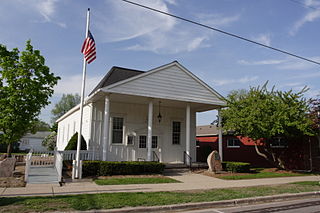
Parma is a village in Jackson County in the U.S. state of Michigan. The population was 769 at the 2010 census. The village is divided into three sections with boundaries in Parma Township and Sandstone Charter Township.

Pinckney is a village in Putnam Township, Livingston County in the U.S. state of Michigan. The population was 2,415 at the 2020 census.

Stickney is a village in Cook County, Illinois, United States. The village is named for Alpheus Beede Stickney, a railroad executive who played a central role in establishing the Clearing Industrial District. Per the 2020 census, the population was 7,110. It was well known in the 1920s and early 1930s as the home for several bordellos linked to mobster Al Capone's empire.

Caledonia is a village in Kent County in the U.S. state of Michigan. The population was 1,622 at the 2020 census. The village is located within Caledonia Township about 15 miles (24.1 km) southeast of downtown Grand Rapids.

Hadley Township is a civil township of Lapeer County in the U.S. state of Michigan. The population was 4,547 at the 2020 Census.
Fruitport Charter Township is a charter township of Muskegon County in the U.S. state of Michigan. The population was 14,575 at the 2020 census. The village of Fruitport is within the township.

Brandon Charter Township is a charter township of Oakland County in the U.S. state of Michigan. The population was 15,384 at the 2020 census.

Groveland Township is a civil township of Oakland County in the U.S. state of Michigan. The population was 5,912 at the 2020 census. Groveland Township was established in 1835.
Ferry Township is a civil township of Oceana County in the U.S. state of Michigan. The population was 1,271 at the 2020 census.

Mattawan is a village in Antwerp Township, Van Buren County of the U.S. state of Michigan. The population was 1,997 at the 2010 census.
Ortonville Township is a township in Big Stone County, Minnesota, United States. The population was 2,011 as of the 2010 census.

Brandon is a city in Douglas County, Minnesota, United States. The population was 501 at the 2020 census.

Decatur is a village in Van Buren County, Michigan, United States. The population was 1,819 at the 2010 census. The village is located within Decatur Township.
Big Stone Township is a township in Big Stone County, Minnesota, United States. The population was 253 at the 2000 census.

Russellville is a village in Jefferson Township, Brown County, Ohio, United States. The population was 542 at the 2020 census.

Millville is a village in Butler County, Ohio, United States. The population was 634 at the 2020 census. Millville sits between Oxford, Ohio and Cincinnati, Ohio along U.S. Route 27.

Burton is a village in Geauga County, Ohio, United States. The population was 1,407 at the 2020 census. It is part of the Cleveland metropolitan area. Burton is the location of Century Village, run by the Geauga Historical Society. The museum village is composed of 19th-century buildings moved there from other locations. Many special events are held there each year, as well as at the Geauga County Fairgrounds, also in Burton.

Jamestown is a village in Greene County, Ohio, United States. The population was 2,052 at the 2020 census.

East Canton is a village in central Stark County, Ohio, United States. The population was 1,521 at the 2020 census. It is part of the Canton–Massillon metropolitan area.

Ortonville is a city and the county seat of Big Stone County in the U.S. state of Minnesota at the southern tip of Big Stone Lake, along the border with South Dakota. The population was 2,021 at the 2020 census. Big Stone Lake State Park is nearby.




















